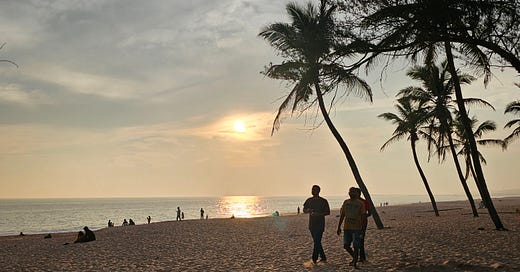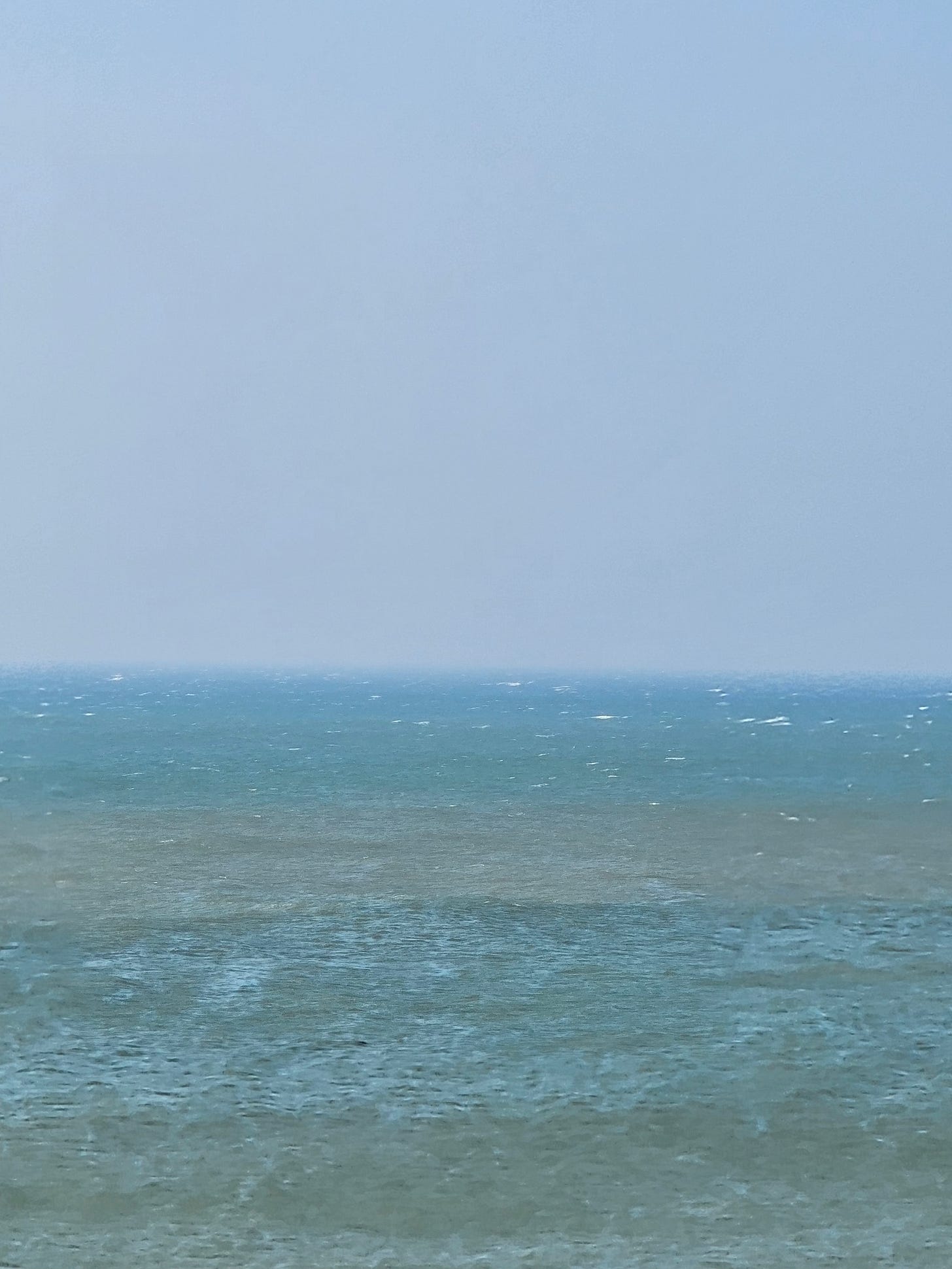Ever realise how, even though we live in a city/town, we don't know about half the interesting stuff it has? It's like a random tourist shows up, and suddenly they're the expert on all things local. I often find this happening to me, especially when the conversation turns to Kanyakumari. Despite being born and having spent all my summer vacations and holidays in Kanyakumari, there are still numerous places I haven't explored or, in some cases, even heard of. Admittedly, part of the reason is that I like staying home and taking the time to "unwind" rather than constantly rushing to go outside.
But this time when I came to Kanyakumari to spend Christmas and my family asked if we’ll go visit a beach some 15 kms from home, I thought, sure. The beach is supposed to look like one of those ‘Goa beaches’. It is called the Lemur beach - not the monkey but something related to the lost continent Lemuria that supposedly connected the Tamil land to Africa. There is a whole lot of literature around Lemuria or the Kumari Kandam and how the first humans supposedly spoke Tamil and so on. Archaeologists don’t have much evidence for this. But that doesn’t stop people from boasting about how great and old their language/ civilisation is. I always wonder where this obsession to be the oldest comes from. Anyway, this is a digression.
I also went and saw the point where the three water bodies - Arabian sea, Bay of Bengal and the Indian ocean meet. It is really something. One might think if three miscible liquids join together, they become homogenous. But counterintuitively, you can see three different layers of water coming from the three different water bodies. The layers, although not distinct to the t, are fairly recognisable. These are called "marine mixing zones" or "convergence zones" and this happens because the water from the three water bodies may have different temperatures, salinities, and densities, creating visible boundaries that resist mixing. Interesting stuff.
This got me thinking about how many things in this world can be surprisingly counterintuitive. It's funny how, without a clear understanding, our initial assumptions can often be turned on their heads. Take the concept of Spontaneous order, it can be counterintuitive for most of us.
Spontaneous order is the emergence of complex and organised structures without central planning or central coordination. Consider language for example, evolution and development of any language happened over time through the decentralised interactions of speakers. It is not like 10 people sat together and decided this will be the structure of this language and these are the list of words that we will use. If you use any other word, you are anti-that language. No, it was organic.
The idea of a free market economy can also be counter intuitive. The notion that individuals pursuing their self-interests, can lead to the spontaneous order of prices, production, and distribution without a central authority planning these activities may be counter intuitive.
This is what Adam Smith refers to as the invisible hand when he writes about markets. You should read the essay I, Pencil by Leonard Read (click here). The pencil narrates how it was created- from the wood that comes from a bark in some tree to the graphite with which we write. You see, no central authority directs the creation of a pencil, but still people manufacture pencils and price them similar to other pencils. This emerges through the voluntary interactions of countless individuals and firms, each pursuing their self-interest.
Freddy Hayek in his seminal essay ‘The Use of Knowledge in Society’ (click here to read) talks about something similar. When you think of a country, it is easy to get carried away into thinking that it is the government’s role to plan what the economy must do. In fact, that is what India, as a country did post independence. We set up a planning commission to decide on what the country must do. The planning commission set up five year plans which the country as whole must adhere to.
Hayek argues that a central authority cannot plan what everyone in the country should do because a central authority does not and can not have all necessary information required to plan.
The peculiar character of the problem of a rational economic order is determined precisely by the fact that the knowledge of the circumstances of which we must make use never exists in concentrated or integrated form but solely as the dispersed bits of incomplete and frequently contradictory knowledge which all the separate individuals possess. The economic problem of society is thus not merely a problem of how to allocate “given” resources—if “given” is taken to mean given to a single mind which deliberately solves the problem set by these “data.” It is rather a problem of how to secure the best use of resources known to any of the members of society, for ends whose relative importance only these individuals know. Or, to put it briefly, it is a problem of the utilization of knowledge which is not given to anyone in its totality.
This can be counter intuitive to many of us. But since we stopped this planning business and decided markets work best when free, India as a country has fared better.
The politics / policy of freeing (read liberalising) the markets in India can itself be an example of how somethings are counter intuitive. If we tell an uninformed person that India shifted its economic policy drastically in favour of markets in the 90s, they would guess that it was under a strong leader with a clean majority who was able to take decisions freely. But that was not the case; in fact, it was the exact opposite (we will see that story another day)
This is the time I introduce you to the brilliant book In Service of the Republic by Ajay Shah and Vijay Kelkar. This book is a guide that helps us think clearly about public policy and economics.
It has around 40 chapters, each explaining different aspect of the relationship between state and markets and how to think about them. I wish to discuss two chapters here, the ideas in which can be viewed as counter intuitive. The two ideas go hand in hand:
Policy making is siege-style assault
Confident policymakers work in the open
There is a common narrative today in India is that criticism and discussion does nothing except slow down decision making. It is said that you need to prioritise speed over deliberation. But counter intuitively, Ajay and Vijay argue that country wide policy making is a siege style assault and not a blitzkrieg. They have a 7 step process which every policy needs to undergo before it is useful. It starts with establishing a cold unbiased (to the level possible) statistical system and includes open discussions, criticism and developing sufficient state capacity. I’m not going to list and explain all the seven steps here but will try to show you a flavour.
Take the ‘91 liberalisation reforms for example. It is sometimes said that India liberalised only to save itself from the balance of payments crisis of the 80s-90s. And that the IMF (International Monetary Fund) from whom we got the loan to fix the crisis forced market principles on us. But a closer look will reveal that it is not that simple.
The policy pipeline was established through the 80s to make the reforms robust. Intellectual foundations were laid in the decades earlier by capable economists which helped create an environment ripe for reforms. If sufficient discussions in the intellectual side and convincing of opposition parties had not done before hand, the 1991 reforms would not have been successful. The authors show the example of Pakistan. Pakistan had taken 21 loans from IMF from 1958 to 2018 but lacked the early stages of policy pipeline to accomplish anything meaningful.
Take another example. The Nirbhaya case created a political movement for reform of the criminal justice system. But because the early stages of building an intellectual foundation was not present in India at that time, the response to such a crisis was weak.
Deliberative decision making is a feature and not a bug in liberal democracies
Authoritative rulers chafe against the checks and balances of a free press, a legislature, the courts and independent statistics. Democratic politics is about the hard work of negotiation, and when it works, the heads of state routinely experience defeat. Authoritarian leaders find this a frustrating process; in fact they are often inexperienced in the culture of democratic law-making. They lack the temperament of sharing power, and are uncomfortable with the tradition of criticism and compromise.
(side bar - look how precise his writing is. Ajay is great. You should follow him )
There is also another practice that governments, especially the current one follows. That is to keep everything secret until the d day and try to force it into others using brute majority in the parliament. There are many examples of this in India. The recent one being the new penal codes and the farm bills to an extent. The godfather of this kind is demonetisation.
…the best policy work gets done in the open. The participatory policy process, grounded in intellectual debate, generates a better reforms process. It helps avoid a policy process that is pure power play. The work is better rooted in the landscape of people and institutions. The mistakes are more likely to be taken out. The negotiations and compromises create support and legitimacy. Policy implementations work out better.
Apart from being the morally right thing to do, the authors believe that a deliberative open discussion forces the stakeholders to involve in the process without hesitation thereby achieving the desired outcome. The authors also illustrate this with examples from the inflation targeting exercise done by the RBI.
This is not to say that this is the case only with the current government. All parties in India are State centric; everyone wants to be at the forefront of decision making and take decisions by themselves. If that is desirable, why bother to even have a parliament. Many countries don’t. Look how they are doing. What rights they have and what they don’t.
Reccos:
One of the authors of the book has an youtube show with Amit Varma (TSATU). It is called everything is everything. Watch. Highly recommend
Read all the essays linked in the post. All of them, highly recommend.
That’s all folks. Drink water. Sleep well.
Merry Christmas to you and your family!
Until next time!





